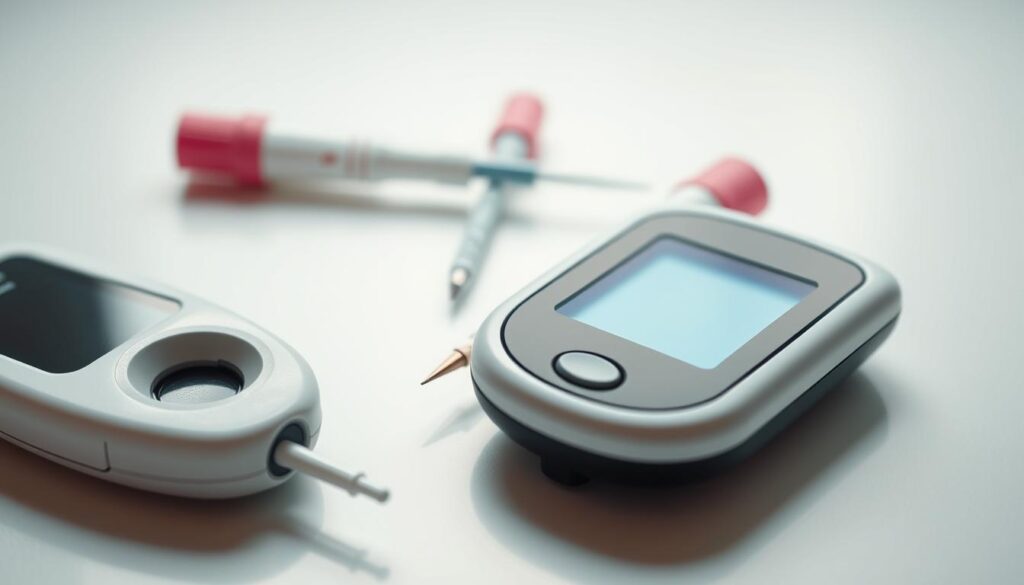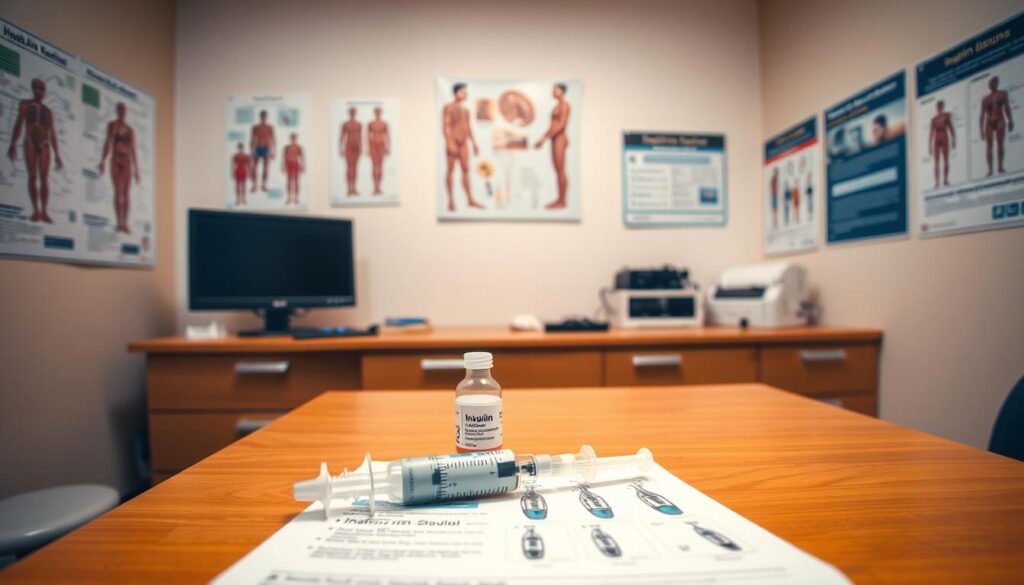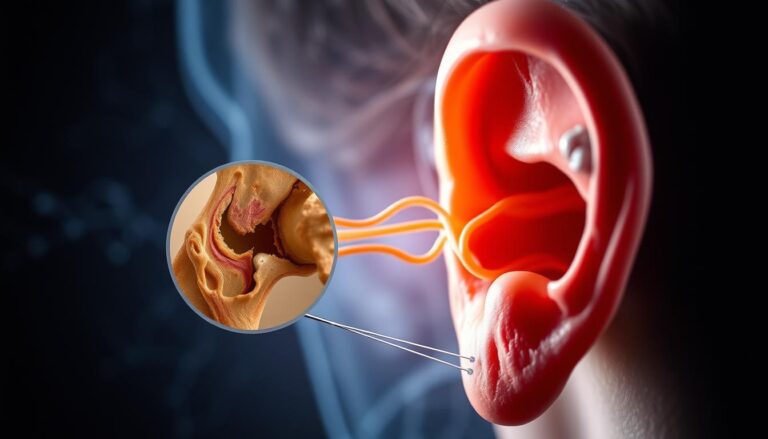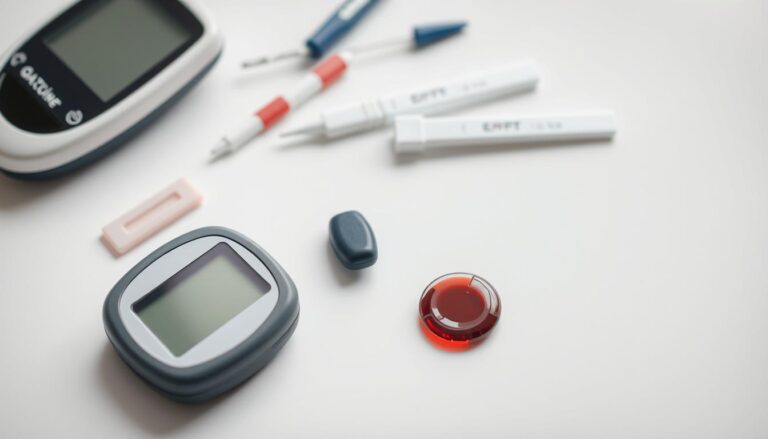Effective Diabetes Treatment Options for Better Health
Table of Contents
Living with diabetes can feel overwhelming. But, knowing your treatment options can change your health journey. Millions of Americans deal with blood sugar control every day, looking for ways to manage their condition well.
Diabetes is a serious disease that needs careful management to avoid serious complications. Your treatment plan should focus on more than just blood sugar levels. It should also improve your overall health and well-being.
Managing diabetes well means using a variety of strategies. You need to understand your diabetes type, try different medical treatments, and keep an eye on your blood sugar. Also, making lifestyle changes that support your health goals is key.
Key Takeaways
- Diabetes treatment requires a personalized, comprehensive approach
- Regular blood sugar monitoring is crucial for effective management
- Medical treatments vary depending on diabetes type
- Lifestyle modifications play a significant role in diabetes care
- Consistent medical guidance is essential for optimal health outcomes
To get better results, you can benefit from the benefits of this nutritional supplement
Understanding Different Types of Diabetes and Their Impact
Diabetes is a complex condition that affects millions in the U.S. It’s important to know the different types to manage and treat it well. Each type has its own challenges in insulin therapy and glucose monitoring.
The three main types of diabetes have big impacts on health. They need different management approaches:
- Type 1 Diabetes
- Type 2 Diabetes
- Gestational Diabetes
Exploring Type 1 Diabetes Characteristics
Type 1 diabetes is an autoimmune condition affecting 2 million in the U.S. It requires constant insulin therapy to control blood sugar. It often starts in children and young adults, making up 5-10% of diabetes cases.
Type 2 Diabetes Overview
Type 2 diabetes is the most common, making up 90-95% of cases. Risk factors include:
- Age over 40
- Obesity
- Family history
- Sedentary lifestyle
With good glucose monitoring and lifestyle changes, many can manage type 2 diabetes well.
Gestational Diabetes Basics
Gestational diabetes occurs in 2-10% of pregnancies. It poses significant health risks. Women with gestational diabetes are 8-10 times more likely to get type 2 diabetes later.
| Diabetes Type | Prevalence | Key Management Strategy |
|---|---|---|
| Type 1 | 5-10% of cases | Insulin therapy |
| Type 2 | 90-95% of cases | Lifestyle changes, medications |
| Gestational | 2-10% of pregnancies | Careful monitoring and diet |
Knowing about these diabetes types helps people manage their health better. It also helps prevent complications.
Diabetes Treatment: Essential Medical Approaches

Managing diabetes is more than just taking medicine. Your treatment plan is made just for you. It helps control blood sugar and prevent serious problems. Taking your medicine as directed is key to staying healthy and avoiding long-term issues.
The main goal is to keep your blood sugar in a safe range. This involves several important steps:
- Regular blood sugar monitoring
- Appropriate medication management
- Lifestyle modifications
- Periodic medical evaluations
Each type of diabetes needs its own treatment plan. Individualized care is essential for preventing complications. Your doctor will look at many things, including:
- Your specific diabetes type
- Overall health status
- Personal medical history
- Potential risk factors
There are many medicines to choose from, like pills, shots, and insulin. The CDC says about 34.2 million Americans have diabetes. This shows how important it is to have a treatment plan that works for you.
| Treatment Category | Key Benefits | Average A1c Reduction |
|---|---|---|
| Metformin | First-line treatment | 1.09% |
| Sulfonylureas | Stimulates insulin production | 1.0% |
| GLP-1 Receptor Agonists | Improves insulin sensitivity | 1.24% |
Managing diabetes is a team effort. You and your healthcare team work together. Sticking to your treatment and staying on top of your health are your best defenses against complications.
Blood Sugar Monitoring and Testing Methods
Managing diabetes well means keeping a close eye on your glucose levels. Knowing the different ways to test your blood sugar helps you stay on top of your health. It also lets you track your progress more accurately.

There are many ways to manage your blood sugar levels. Each method gives you different insights into your body’s health. They help you understand how your body reacts to different things.
Continuous Glucose Monitoring Systems
Continuous glucose monitoring (CGM) systems are a big step forward in tracking blood sugar. These devices give you real-time updates on your glucose levels. This lets you:
- Get alerts for high or low blood sugar right away
- See how your glucose levels change throughout the day
- Learn how food and exercise affect your blood sugar
Experts say it’s best to keep your glucose levels between 70 and 180 mg/dL most of the time. CGM systems help you do this by monitoring your levels constantly.
A1C Testing and Its Importance
The A1C test gives you a big picture of your blood sugar control over three months. It shows you:
- An A1C of 6.5% or higher means you have diabetes
- Levels between 5.7% and 6.4% mean you might have prediabetes
- The goal for most people is to keep their A1C below 7%
Regular Blood Sugar Testing Schedules
Testing your blood sugar regularly is key to managing diabetes. How often you should test depends on your diabetes type:
- Type 1 diabetes: Test many times a day
- Type 2 diabetes (non-insulin): Test less often
- Good blood sugar targets are:
- Before meals: 80 to 130 mg/dL
- Two hours after meals: Less than 180 mg/dL
By using these testing strategies, you can better understand your blood sugar control. This helps you work closely with your healthcare provider to manage your diabetes well.
To get better results, you can benefit from the benefits of this nutritional supplement
Insulin Therapy and Administration Techniques

Insulin therapy is key for many with diabetes. It helps manage blood sugar levels, affecting your health and life quality. Knowing about insulin types and how to use them is crucial for managing diabetes.
Different insulins have different roles in treating diabetes:
- Rapid-acting insulin: Works fast to control blood sugar during meals
- Long-acting insulin: Keeps insulin levels steady
- Intermediate-acting insulin: Helps balance blood sugar
There are several ways to take insulin:
- Traditional syringes
- Insulin pens
- Insulin pumps
- Inhaled insulin devices
| Administration Method | Pros | Cons |
|---|---|---|
| Syringes | Most affordable | Less convenient |
| Insulin Pens | Easy to use | Higher cost |
| Insulin Pumps | Precise insulin delivery | Requires extensive training |
Effective insulin therapy needs careful monitoring and consistent technique. Always rotate injection sites to avoid tissue damage and ensure insulin absorption. Your healthcare provider can create a personalized plan for your diabetes treatment.
Oral Medications and Alternative Treatments
Managing diabetes treatment needs a full plan of action. Your healthcare provider can guide you through the many oral medication choices. They help control your blood sugar levels effectively.
Sticking to your diabetes medication is key to success. Knowing the different oral medications helps you make better health choices.
Metformin: The First-Line Treatment
Metformin is the main drug for type 2 diabetes. It works by:
- Lowering liver glucose production
- Boosting insulin sensitivity
- Usually taken twice a day
- Costs about $10 per month
SGLT2 Inhibitors: Advanced Diabetes Care
SGLT2 inhibitors are new in diabetes treatment. They’re great for those with:
- Chronic heart failure
- Heart disease
- Hard time controlling blood sugar with metformin
GLP-1 Receptor Agonists: Innovative Approach
GLP-1 receptor agonists are a new way to treat diabetes. Drugs like Trulicity and Ozempic have special benefits. They:
- Boost insulin production
- Lower liver glucose production
- Are available as weekly or daily injections
Your diabetes care plan should fit your unique health needs. It’s important to talk to your healthcare provider. They can help find the best treatment for you.
Lifestyle Modifications for Diabetes Management
Managing diabetes is more than just taking medicine. What you eat and how much you move are key to keeping blood sugar in check. Making lifestyle changes can greatly help in managing diabetes.
Creating a good plan for diabetes management includes several important steps:
- Developing a consistent exercise regimen
- Implementing strategic dietary management
- Maintaining stress reduction techniques
- Prioritizing quality sleep
Exercise is a big part of controlling diabetes. Healthy adults should do at least 150 minutes of moderate-intensity aerobic activity each week. You can start with simple things like walking after dinner or using stairs.
What you eat is also very important. Here are some tips for your diet:
- Choose whole, plant-based foods
- Limit saturated fats and processed foods
- Implement “Meatless Monday” to incorporate nutritious beans and lentils
- Cook meals that benefit both diabetic and non-diabetic family members
Keeping track of your progress can help you stay motivated. Use activity trackers, check your blood sugar often, and set realistic health goals. Losing just 7% of your body weight can cut diabetes risk by over 50%.
Your commitment to lifestyle changes is the most powerful medicine in managing diabetes.
Dietary Guidelines and Nutritional Considerations
Managing diabetes through diet is key. What you eat affects your blood sugar and health. Knowing the right foods can greatly improve your diabetes care and daily life.
Start by learning how foods affect your blood sugar. The plate method is a simple way to make balanced meals:
- Fill half your plate with non-starchy vegetables
- Allocate one-quarter of the plate to lean proteins
- Use the remaining quarter for carbohydrate-rich foods
To get better results, you can benefit from the benefits of this nutritional supplement
Carbohydrate Counting
Learning to count carbs is important. The American Diabetes Association suggests eating 45% to 60% of your calories as carbs. Managing carbs well can keep your blood sugar stable.
| Carbohydrate Type | Recommended Intake | Blood Sugar Impact |
|---|---|---|
| Whole Grains | 45-60 g per meal | Slow, steady release |
| Fruits | 1 medium piece | Moderate impact |
| Starchy Vegetables | 1/4 plate portion | Gradual absorption |
Meal Planning Strategies
“Proper nutrition is the foundation of diabetes management” – American Diabetes Association
Your meal plans should aim for balanced nutrition. Pairing carbs with protein, fat, or fiber can slow down blood sugar increases. The World Health Organization says eating at least 25g of fiber daily is good for diabetes control.
Healthy Food Choices
Focus on whole foods that help keep blood sugar stable. Opt for lean proteins, lots of veggies, and complex carbs. Stay away from processed foods and sugary drinks that can quickly raise blood sugar.
Conclusion: Integrating Treatment for Optimal Diabetes Management
Managing diabetes well needs a complete plan. With about 30.3 million Americans with diabetes, it’s key to know how to manage it. Making lifestyle changes is crucial to keep blood sugar levels in check and avoid serious problems.
Your diabetes care plan should include doctor visits, regular checks, and changes in your daily life. Studies show that using other health methods and staying active can greatly improve your health. Products not made from herbs have helped lower blood sugar levels by at least 0.5% in tests.
Studies on integrated care show great results, like a 40% lower death risk and better life quality. Taking a whole-body approach to diabetes care can boost your physical and mental health. Remember, everyone’s diabetes path is different. Working with doctors will help you find the best way to manage your diabetes.
The future of diabetes care is bright, with new research and treatments coming up. Keep up with the latest health news, stay active in your care, and use all the tools available to manage your diabetes well.
FAQ
What are the main goals of diabetes treatment?
The main goals of diabetes treatment are to keep blood sugar levels in check. It also aims to prevent complications and manage other health issues. This is done through a mix of medication, lifestyle changes, and regular check-ups.
How do Type 1, Type 2, and gestational diabetes differ?
Type 1 diabetes is when the body can’t make insulin, often starting in childhood. Type 2 diabetes is when the body doesn’t use insulin well, often due to lifestyle. Gestational diabetes happens during pregnancy and usually goes away after giving birth, but raises the risk of Type 2 later on.
What is continuous glucose monitoring (CGM)?
Continuous glucose monitoring tracks your blood sugar levels all day and night. It uses a small sensor under the skin to measure glucose levels constantly. This gives you real-time feedback to help manage your diet, exercise, and medication.
What types of insulin are available?
There are different types of insulin: – Short-acting insulin works fast to control blood sugar during meals. – Long-acting insulin keeps blood sugar steady all day. – Intermediate-acting insulin is a middle option between short and long-acting. – Rapid-acting insulin starts working almost right away after injection.
What is metformin, and why is it important?
Metformin is often the first choice for Type 2 diabetes. It helps lower blood sugar by reducing liver glucose production and improving insulin sensitivity. It’s chosen for its effectiveness, low cost, and few side effects.
How does diet impact diabetes management?
Diet is key in managing diabetes by controlling blood sugar. Important strategies include counting carbs, choosing low glycemic index foods, and eating balanced meals. Consistent meal times and portion sizes are also crucial.
How often should I test my blood sugar?
Blood sugar testing frequency depends on your diabetes type and treatment. People with Type 1 diabetes might test 4-10 times a day. Those with Type 2 might test 1-2 times a day. Your doctor will guide you based on your needs.
What lifestyle modifications can help manage diabetes?
Effective lifestyle changes include: – Regular exercise (at least 150 minutes of moderate activity weekly) – Healthy weight management – Eating a balanced diet – Managing stress – Getting enough sleep – Avoiding smoking and limiting alcohol
Are there new treatments emerging for diabetes?
Yes, new treatments are being developed. These include advanced glucose monitoring technologies, better insulin delivery systems, and new medications like SGLT2 inhibitors and GLP-1 receptor agonists. Future treatments might include stem cell therapies and personalized medicine.
To get better results, you can benefit from the benefits of this nutritional supplement









